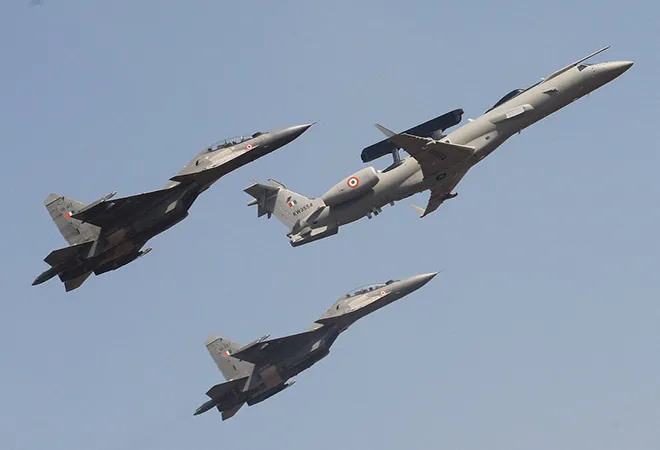
Less than two weeks after 46 CRPF personnel were massacred in Pulwama, India has struck back, conducting three air strikes on terror camps in Pakistan. The strikes come days after Prime Minister Narendra Modi promised to avenge the attack, assuring the country that the sacrifices of the soldiers would not go in vain. While reading a prepared statement on Tuesday, the Foreign Secretary confirmed that the attacks targeted Jaish e- Mohammad training camps, including the terrorist group’s largest camps in Balakot.
Pakistan has predictably spun a different story. While their military spokesperson has confirmed that the Indian Air Force crossed the Line of Control from Muzaffarabad sector, they have claimed that they were forced to return because of “timely response from the Pakistani air force, releasing a payload in haste”.
According to them, there were no casualties or damage. While Pakistan’s denial is unsurprising, the country has acknowledged that India entered their air space, a fact that they refused to accept in 2016 when India carried out surgical strikes after Uri. This means that should Pakistan respond, it would be only to India’s violation of its airspace. If they have denied the existence of JeM camps in the first place, then how can they acknowledge India’s destruction of them?
The jawans killed in Pulwama, who were travelling back to work after a break with family at home, was hit by a car carrying explosives, driven by (the suicide bomber) Adil Dar, who joined Jaish-e-Mohammad last year. In the hours following the attack, JeM, whose headquarters are in Bawalpur in Punjab, was quick to put out a statement claiming responsibility for the attack and revealing information about Dar, who hails from Kakapora in Pulwama. The idea was to inform and influence the world that the attack was done by an Indian Kashmiri. The facts could not no further from the twisted truth that Pakistan propagates. The fact that JeM has claimed responsibility for Dar and his training (in Pakistan) and the fact that it continues to function despite being an internationally known terrorist group, under the auspicious and blessings of the Inter-Services Intelligence agency are facts that that Pakistani media continues to ignore.
These strikes have once again, to use the overused cliché, put the ball in Pakistan’s court. Being at the receiving end of Pakistan’s sub conventional warfare for the past decades, India has searched for ways, tools and methods to deter Pakistan. It seems that now, surgical strikes (which are publicly declared) are an established weapon in India’s retaliatory tool box. As a “weapon” surgical strikes fulfill two objectives: the first being a removal of camps where attacks are planned and organized; and the second, they help quench public demand for revenge. Other than that, their impact is limited. They are easy for Pakistan to deny, and therefore are ineffective as stand-alone tools of coercion.
Nonetheless, while surgical strikes achieve only their specific objectives, they open up the possibility of India adopting them as a preventive security tool.
Similar to the 2016 surgical strikes, the government has declared that they were acting on intelligence that future attacks were being planned in said camps, and therefore struck the camps in a preemptive move. By this logic, India should conduct strikes in PoK and Pakistan, whenever it deems necessary, not riding on the back of another terrorist attack. Removing militants who are training to infiltrate and attack India, before they actually do, will set a new dangerous precedent, one that will force the Pakistani establishment to either rethink their strategy or create new redlines for targeted Indian strikes.
Until yesterday, it seemed that Pakistan was succeeding. They could recruit someone from across the border, bring him over, train him, and carry out a large scale attack on Indian security forces, and walk away with nothing but another bruise on their integrity as a nation. The Pulwama attack, led to a series of unfortunate incidents where Kashmiri students and workers were beaten up, harassed, evicted from their homes from certain parts of the country. Many returned home to Kashmir, fearing an increased backlash. This fits perfectly into Pakistan’s doctrine of “bleeding India with a thousand cuts”. The cost of destruction of militant camps in the strikes is negligible, compared to what Pakistan wants to achieve in the long run. The targeting of Kashmiris across the country is not only shameful, bigoted and devoid of any logical explanation, but it feeds into the Pakistani narrative that Kashmiri is not safe in Indian hands. While the strikes do not change anything on the ground, they remove the notion that Pakistan can get away with cold blooded murder.
India knows the game that Pakistan is playing, and has had decades to understand the rules that Pakistan has set for its relationship. These strikes, don’t change the game or the rules, they just rattle the game board, forcing Pakistan to think twice, before it decides to roll the dice and attack India again.
The views expressed above belong to the author(s). ORF research and analyses now available on Telegram! Click here to access our curated content — blogs, longforms and interviews.



 Less than two weeks after 46 CRPF personnel were massacred in Pulwama, India has struck back, conducting three air strikes on terror camps in Pakistan. The strikes come days after Prime Minister Narendra Modi promised to avenge the attack, assuring the country that the sacrifices of the soldiers would not go in vain. While reading a prepared statement on Tuesday, the Foreign Secretary confirmed that the attacks targeted Jaish e- Mohammad training camps, including the terrorist group’s largest camps in Balakot.
Less than two weeks after 46 CRPF personnel were massacred in Pulwama, India has struck back, conducting three air strikes on terror camps in Pakistan. The strikes come days after Prime Minister Narendra Modi promised to avenge the attack, assuring the country that the sacrifices of the soldiers would not go in vain. While reading a prepared statement on Tuesday, the Foreign Secretary confirmed that the attacks targeted Jaish e- Mohammad training camps, including the terrorist group’s largest camps in Balakot.
 PREV
PREV


